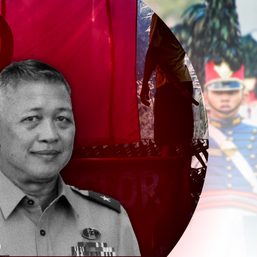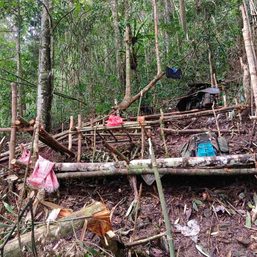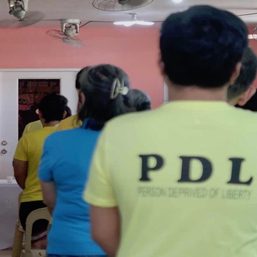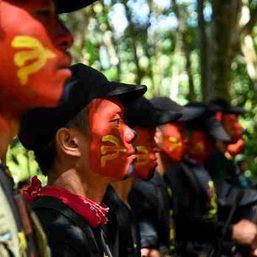SUMMARY
This is AI generated summarization, which may have errors. For context, always refer to the full article.
![[OPINION] The CPP-NPA’s 3rd Rectification Movement is bad news to the peace process](https://www.rappler.com/tachyon/2024/01/tl-cpp-npa-peace-talk-rectification.jpg)
News of the Oslo Joint Communiqué between the Philippine government and the National Democratic Front (NDF), the political arm and united front organization of the Communist Party of the Philippines (CPP), was met largely positively by the public. While there was some skepticism from certain quarters, the emergence of a possible political settlement with an old foe was a positive development that could not be ignored.
And who wouldn’t be hopeful? In the joint communiqué, both the government and the NDF spoke about “uniting as a nation,” “facing foreign security threats,” “final peace agreement,” and, most importantly, “ending the armed struggle” – buzzwords that gave hope to a conflict-weary nation.
Many saw the communiqué as an important development as both parties agreed to a principled and peaceful resolution of the armed conflict and, most importantly, ending the armed struggle. The NDF agreed that the exploratory talks shall pave the way for the transformation of the CPP-New People’s Army (NPA) from an armed force devoted to a “people’s war” against the State to a legal political movement that is the government’s partner for peace and development.
Truth be told, many questioned the necessity of negotiating with a spent force. Undeniably, the NPA is at it’s weakest in its 55-year old history. Since the “whole of nation” approach was implemented by the National Task Force to to End Local Communist Armed Conflict five years ago, 76 out of the 89 guerilla fronts (GFs) have been completely dismantled. The remaining 14 guerilla fronts – mostly in the Visayas and Mindanao – are all weakened, devoid of the support of the mass base where they draw their sustenance. Around 4,051 barangays have been cleared by government forces and are ready to receive development projects and livelihood programs.
Focused military operations against CPP-NPA-NDF forces have resulted in the neutralization of 8,645 of its members, including 314 high value personalities such as Benito Tiamzon, the former chair of the CPP Central Committee and his wife Wilma; Jorge “Ka Oris” Madlos, head of the Komiteng Mindanao (KOMMID); and Eric Casilao, secretary of the Southern Mindanao Regional Committee (SMRC), to name a few. With the death of their beacon and ideologue Joma Sison in the Netherlands, the communists have been devoid of effective leadership leading to mass surrenders of their members.
Nonetheless, if we can prevent violence and the loss of more Filipino lives, exploratory talks are worth considering even if there are now zero active guerilla fronts and the NPA armed strength is down to less than 1,500 fighters. We saw the joint communiqué as a welcome development because it could lead to peace quicker.
However, the CPP-NPA’s sudden announcement of its 3rd Rectification Movement last December was a bombshell that peace advocates were not expecting. In its 55th anniversary statement on December 26, 2023, the CPP Central Committee called on all its cadres and committees to carry out a “3rd Rectification Movement” to further advance its revolutionary armed struggle. Instead of a rectification movement preparing for the NPA’s transformation provided in the Oslo Joint Communiqué, the CPP instead called for a rectification movement doubling down on its commitment to carry forward the armed struggle, which it euphemistically calls the “national democratic revolution” towards “complete victory.”
This 29-page statement by the CPP-NPA-NDF goes against what has been agreed upon by both parties in Oslo, Norway. Nowhere in the anniversary statement does it state their full commitment to ending or abandoning the armed struggle or, at the very least, their sincerity and commitment to peace talks. Instead, the CPP-NPA-NDF has reaffirmed its undying allegiance to Joma Sison’s obsolete Marxism-Leninism-Maoism application to Philippine conditions, and called on the NPA to “stir up and spread the flames of the people’s war.”
The anniversary statement is available online (and I invite the public to peruse it), and you will find it replete with numerous directives to its remnants to “launch basic or annihilative tactical offensives, strike the isolated and detached units of the government, wage active warfare and guerilla campaigns, undertake widespread warfare, carry out special partisan operations,” etc.
As it stands now, the CPP-NPA-NDF is still well-determined to regroup and rebuild what remains of it’s forces to continue its “protracted people’s war” in hopes of achieving its end goal of overthrowing our democratic government. Does this mean that the CPP-NPA-NDF has not moved an inch away from its revolutionary cause as it only awaits for the right conditions to seize power?
To make matters worse, the CPP in the same statement called the forthcoming “exploratory talks” resulting from the Oslo Communiqué as “an additional battlefield to advance the national democratic cause.” The use of the word “battlefield” is telling. This only means that the CPP have not abandoned its original position – and I quote Luis Jalandoni – that peace talks are “another form of legal struggle, which is possible to be used by the revolutionary forces in order to advance the revolutionary armed struggle and the revolutionary mass movement.”
While we are hopeful and optimistic of the exploratory talks, we cannot turn a blind eye to the CPP’s anniversary statement. While we support the exploratory talks, its success will entirely depend on the sincerity, truthfulness, and commitment of the CPP-NPA-NDF towards achieving a peace settlement and ending armed hostilities.
In the government’s long history of negotiations with the CPP-NPA-NDF since 1986, all peace talks with them have led to nowhere, while those with the Muslim secessionist movements have succeeded. This pattern raises serious questions about the genuine intent of the CPP-NPA-NDF in calling for – nay, demanding – peace talks at every possible opportunity with each and every administration.
Instead of talking about a final peace agreement or a political statement, the CPP-NPA-NDF is talking about a 3rd Rectification Movement to “rectify errors, unite and lead the broad masses of the Filipino people in fighting the US-Marcos regime, and advance the revolutionary armed struggle.” To quote the CPP’s statement, “the Party is firmly united in waging protracted people’s war along the strategic line of encircling the cities from the countryside.”
Are these the words of an organization truly committed to the exploratory talks to end the communist armed conflict?
In recognizing its critical errors, weaknesses, and shortcomings, the CPP-NPA-NDF has to come to terms that calling for a new rectification is the only way to slow down the demise of its futile armed struggle and resuscitate a dying ideology that has claimed more than 40,000 lives in its 55-year armed conflict. This discrepancy between words and actions raises concerns about the authenticity of their commitment to a genuine and lasting peace.
Given this alarming development, the sincerity of the CPP-NPA-NDF in engaging in exploratory talks must be scrutinized by the people carefully. The history of failed negotiations, the continuing perpetration of violence, and inconsistent statements all contribute to a narrative that challenges the authenticity of the CPP-NPA-NDF’s commitment to a peaceful resolution. It is essential that we approach future discussions with a discerning eye.
While we support the exploratory talks, we firmly insist on concrete actions that demonstrate the CPP-NPA-NDF’s genuine desire for lasting peace in our country. They know the true state of their forces and their capabilities. We urge them to show moral courage and come to the exploratory talks with open minds and hearts for the sake of the Filipino people.
If the exploratory talks fail, they have no one to blame but themselves. – Rappler.com
Jonathan E. Malaya is the assistant director-general of the National Security Council and former undersecretary of the Department of the Interior and Local Government. He is also the spokesperson of the National Task Force West Philippine Sea and former senior lecturer at the University of the Philippines National College of Public Administration and Governance and the University of Makati.
1 comment
How does this make you feel?




![[Newsstand] Time to negotiate peace again with the CPP-NPA](https://www.rappler.com/tachyon/2024/05/negotiate-peace-again-may-10-2024.jpg?resize=257%2C257&crop_strategy=attention)

![[WATCH] In the Public Square with John Nery: 10 years of peace, recommitting to the Bangsamoro peace process](https://www.rappler.com/tachyon/2024/01/Episode-62-In-the-Public-Square-LS.jpg?resize=257%2C257&crop=395px%2C0px%2C1080px%2C1080px)

Notable is the statement: “If the exploratory talks fail, they have no one to blame but themselves.” This does not align with the so-called “Whole of Society” approach to Counter-Insurgency. If this approach is applied to such exploratory talks, the other aspects, economic, social, political, etc., should be considered. Unfortunately, the said statement considered only one aspect. Hence, exploratory talks that do not apply said approach will more probably fail.